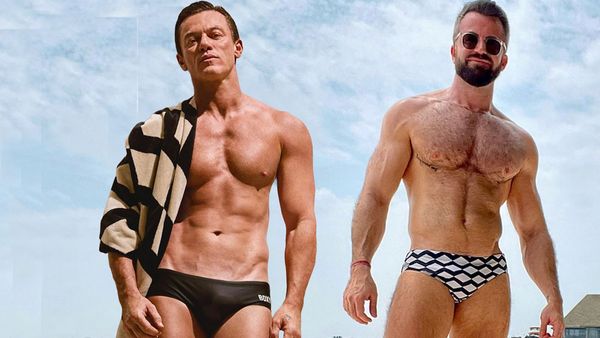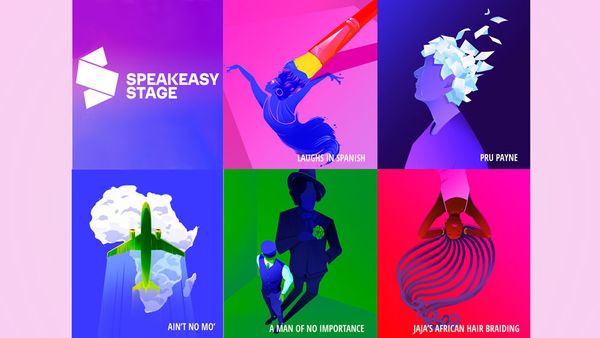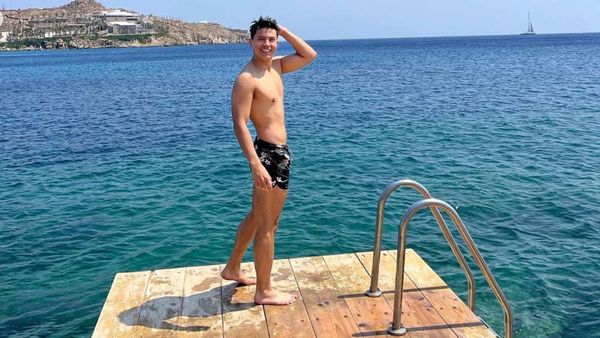September 6, 2016
With 'Lured,' Playwright Frank Avella Looks at Homophobia in Russia
READ TIME: 11 MIN.
Readers of this website will likely recognize Frank J. Avella's name -- he's been an EDGE contributor for some time. What they may not know is that he is also an accomplished playwright with some 19 full-length plays to his credit, 10 of which have been produced.
"Lured," his latest, is currently at New York's Theater for the New City, where it plays through September 18. He came to write the play while on a residency at the Helene Wurlitzer Foundation in Taos, New Mexico. He came to the fellowship because of his play "Consent," which also won him a 2015 Fellowship Award from the NJ State Council on the Arts and a semi-finalist for the 2012 O'Neill. It will be published by Adirondack Plays as part of an LGBTQ anthology this winter.
If there's a meme to Avella's plays, it is his social awareness of LGBTQ issues. "Consent" dealt with homophobia and bullying; "Vatican Falls" is set against the backdrop of the Catholic sex abuse scandal; and "Lured" concerns a the rampant homophobia that exists in today's Russia.
"I wrote 'Lured' because of human rights violations in many parts of the world - not just Russia - being perpetrated against the LGBTQ community. The government and church sanctioned mistreatment and persecution of gays must be exposed and the scapegoating must end. I also wanted to explore notions of hate and how no one is born to hate, it's a learned trait. 'Lured' is a play about humanity and how people can easily be swayed into doing unspeakable things. We want to shed light on these horrible crimes that are being committed against LGBTQ people. The 'Lured' team plan to produce a compelling show that will create dialogue and debate."
EDGE spoke to Avella about the play and his career.
Exploring Hate
EDGE: What prompted you to write the play?
Frank J. Avella: I remember becoming aware of the reports coming out of Russia about the entrapments and harassment of gays in late 2013 and I started following the stories. I knew then I had to write about it but I wasn't sure what form it would take and what my story would be so I took 'copious' (a word used pointedly in the play) notes and finally found my way in but I needed time to develop the piece.
Earlier this year, I was lucky enough to have been awarded a residency at the Helene Wurlitzer Foundation in Taos, New Mexico where I drove cross-country and just wrote for three months (that and I met some of the most inspiring fellow artists). I already had a stockpile of research I had done over the years. But now it was time to go on lockdown so I spent a week cut off from everything and everyone watching these horrific, real videos of Russian youth (many teens) hunting gays for sport and doing the most monstrous things to them. I also poured over a report compiled by Human Rights Watch as well as immersing myself in articles and victim testimonies. And I wrote. And wrote. Suffice to say it was a very dark week, but I came out of it with a play I am very proud of.
EDGE: How would you describe it?
Frank J. Avella: A brutal and frank depiction of the consequences of scapegoating.
The play takes real events and gives it a fictional twist in an attempt to try and explore hate and how it is a learned trait. And although it takes place in Russia, it is an exploration of what could happen ANYWHERE when a government (and church) decides to blame an already loathed group, in this case the LGBTQ community, for their country's economic and social strife. The piece pulls no punches. It's pretty relentless.
And the cast breathes amazing life into each character. They are truly astonishing.
Thugs Still Hard at Work
EDGE: The outrage about LGBTQ persecution in Russia has been sporadic at best in the press. Why don't you think it isn't a bigger human rights issue?
Frank J. Avella: I think that the media would rather fixate on titillation and who the Kardashians are sleeping with than report anything too real. And that's across the board. Sure, when the story first broke it made a few headlines (more like page sevens) but it very quickly got replaced by more salacious stories, and very few in the U.S. media bother doing any follow through. (I know HRW tries but the Russian media is Putin controlled.)
Truth to be told, after all the reports in 2014, things quieted down. Posts were taken down. These homophobic thugs are probably still hard at work, but it's all very hush hush now.
If more pressure were put on Putin perhaps things could change, but politicos don't seem to care and the media has all but given up.
EDGE: What was the most surprising thing you learned in your research?
Frank J. Avella: The mercenary aspect of many of these hate groups surprised me most. Certainly, groups like 'Occupy Pedophilia' purport that they are protecting children with their vigilante techniques and they call themselves a 'social movement,' but imitation branches and groups have cropped up almost exclusively to extort money from their victims. They could care less about the 'cause.' They're in it to blackmail LGBT people, who can often lose their job, be disowned by their families and shunned by their communities if their sexual orientation is exposed. We touch upon this a bit in 'Lured.'
The other surprise for me was just how many Russians are not religious, but listen to and follow the anti-gay rhetoric of the Russian Orthodox Church.
Is Russia Inherently Homophobic?
EDGE: Homophobia in Russia is pretty much mainstream. Why do you think that is?
Frank J. Avella: Same-sex relations have never been accepted in Russia, according to the research I found, and certainly not during the Soviet era when a conviction of sodomy came with five years of hard labor and intense psychiatric treatment. I am no expert and I don't pretend to be, beyond the scope of the research I did for the play, but there does seem to be a parallel with homophobia being steeped in the Italian culture, which comes directly from the Vatican, despite Italians being less religious. Governments take advantage of that and exploit it as a means of blaming LGBT people for their own mess. And scapegoating often leads to genocide.
EDGE: Do you think that attitudes towards the LGBTQ community in Russia can change as they have in the United States?
Frank J. Avella: That is a very difficult question for me to answer.
I think the Russian people would need to elect officials who actually cared about making life better for them. As we explore in 'Lured,' no one is born feeling hatred. It is a trait we acquire from our parents and surroundings.
It is telling that many of the victims of these hate crimes have been given asylum here in the U.S., and the lion's share of these refugees now live in New York City.
EDGE: 'Lured' is only one hour long. Why the brevity?
Frank J. Avella: It is a full night of theatre, but because of the savagery and intensity of the piece one hour is just the right amount of time to spend in such a toxic climate. Any more might feel sadistic.
EDGE: Do you want to expand it into a longer piece?
Frank J. Avella: Depends on who is asking! Anyone who knows me knows that to ask me to write MORE is a kind of ecstasy for me!
Why Playwriting?
EDGE: How did the production at Theater for the New City come about?
Frank J. Avella: Michael Scott-Price, the intrepid Dream Up Festival Director, knew my work. He selected another controversial play of mine, 'Vatican Falls,' for his New Works, New Blood Series a few years back when everyone else was afraid of it. So, even though the play was so new, I sent it to him and got an immediate response back that we were in the Festival!
EDGE: I know you as a contributor to this website. How did playwrighting happen for you?
Frank J. Avella: I was in the Tisch program when I wrote my very first play and I've been at it ever since. But it's just in the last 10 years that I feel my work has the kind of relevance that it should. I am proud of my early work, but there's something that drives me now. I feel like I'm exploring things that matter. Gray areas. And I love writing.
EDGE: Who are your influences?
Frank J. Avella: Eugene O'Neill, Terrence McNally, Joe Orton, Christopher Durang, Martin Sherman, Wendy Wasserstein, Woody Allen, Billy Wilder, Aaron Sorkin, Lars von Trier. Too many to list in theatre and film. Robert Altman was an author of sorts. Certainly, an auteur.
EDGE: A reviewer wrote that 'Avella's plays tend to send earthquakes through his audience's comfort zones.' Do you set out to provoke your audiences?
Frank J. Avella: I don't really set out to provoke. I think it just happens. With that particular play, 'Iris,' I was writing a farce about a 25-year-old girl who looks up her 40-year-old biological father, and falls in love with him. And they STAY TOGETHER. It was a springboard to explore societal notions of love and family and fidelity at a time when gay marriage wasn't even uttered by anyone. I'm very proud of that play. I am much more interested in wanting to know WHY people do what they do, than wanting to see them punished for it.
And I was actually asked by an interviewer, at the time (2005) if I was condoning incest. Seriously? Did you not get the satiric nature of the piece? Guess he thought 'Prizzi's Honor' was a drama. (That's an obscure reference to brilliant 1985 John Huston film no one talks about any more.)
EDGE: What advice would you give a LGBTQ person living in Russia today?
Frank J. Avella: That they're not alone, and that there is nothing wrong with them for loving in a manner that they're erroneously told is inhuman. That there are people in this world who care deeply about them and are fighting for them. And that there are places they can go where they will be loved and accepted for who they are. I'm not necessarily advocating turning their back on their country and culture, but if the climate becomes too frightening, I guess I am advocating that.
EDGE: You see a lot of films (and write about them), do movies influence the way write for the theater?
Frank J. Avella: Most definitely. I am constantly being told that my work is cinematic and that is deliberate on my part when I write. I love the blend. 'The History Boys' by the great Alan Bennett, brilliantly medium-mashed. 'Lured' is very cinematic in style. That doesn't mean it would make a better film than theatre piece -- although it would make for quite a film!
When I was growing up, life was all about submersion into the world of cinema. It was an escape -- a warm, cozy place for someone who never quite felt that he completely fit in anywhere but was pretty fine with that feeling because he had a strange kinship with all things celluloid. That was what mattered. And got me through. And still does sometimes.







